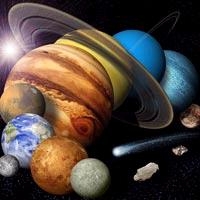1 September 2006
And then there were 8
The 26th General Assembly of the International Astronomical Union (IAU) recently voted a new definition of Solar System bodies in which Pluto sees its status as a planet revoked.
According to the new definition, to be called a planet an object has to exhibit 3 traits: it must orbit the Sun*; its own gravity must pull it into a nearly round shape; and it must have cleared away other objects in its neighbourhood—this is where Pluto comes up short.
According to the new definition, to be called a planet an object has to exhibit 3 traits: it must orbit the Sun*; its own gravity must pull it into a nearly round shape; and it must have cleared away other objects in its neighbourhood—this is where Pluto comes up short.

So, we now find ourselves with just 8 planets in the Solar System:
Mercury, Venus, Earth, Mars, Jupiter, Saturn, Uranus and Neptune.
The IAU has created 2 other categories to classify celestial bodies that are not planets.
The 1st of these is the “dwarf planet” category to which Pluto has been relegated.
Dwarf planets need only meet 2 criteria, namely they must orbit the Sun and be nearly round in shape.
For example, the asteroid Ceres and the distant object 2003 UB313 (nicknamed Xena) fall into this category.
And the list probably won’t end there, since the IAU has a dozen potential dwarf planets on its watchlist.
Other bodies orbiting the Sun that are neither planets nor dwarf planets will be called “small solar-system bodies”. Earth’s Moon conserves its status as a natural satellite.
For example, the asteroid Ceres and the distant object 2003 UB313 (nicknamed Xena) fall into this category.
And the list probably won’t end there, since the IAU has a dozen potential dwarf planets on its watchlist.
Other bodies orbiting the Sun that are neither planets nor dwarf planets will be called “small solar-system bodies”. Earth’s Moon conserves its status as a natural satellite.
Pluto no longer fits
Lying at the outer reaches of the Solar System, Pluto has always been a case apart.
Its status as a planet has long stirred controversy due to its small size and an elliptical orbit highly tilted to the ecliptic plane.
What’s more, at about 2,300 km across Pluto is in fact much smaller than our Moon!
Its status as a planet has long stirred controversy due to its small size and an elliptical orbit highly tilted to the ecliptic plane.
What’s more, at about 2,300 km across Pluto is in fact much smaller than our Moon!
Pluto also crosses Neptune’s orbit on its revolution around the Sun, which lasts 247 Earth years. Added together, all these traits made Pluto something of a misfit in the planet category.
Pluto is the only object among the rocky and gaseous bodies of the Solar System that is composed mainly of ice. It was discovered relatively recently, by the American astronomer Clyde Tombaugh in 1930.
* This definition does not apply to planets orbiting other stars.
* This definition does not apply to planets orbiting other stars.